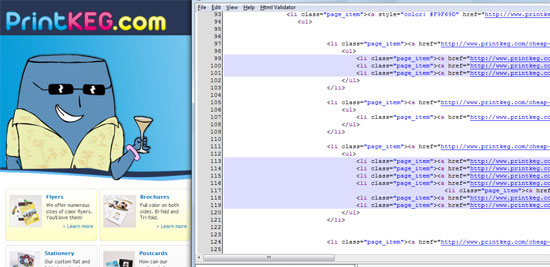
In Web Marketing Tips Part 1 – Domain, I identified concerns with the domain name and hosting. Before going into more specific web promotion strategies, we should outline a few general rules and practices for the overall search engine friendliness of your website.

GENERAL WEBSITE TECHNIQUES
9. Good content on all pages – Each of the pages on your website should be useful and necessary information. A couple lines and mostly images on each page is not going to get the job done. Three paragraphs on each page minimum. Good content could also lead to others linking to your website. Try not to have the same boring information others may already be providing. You may be better off linking to those sites unless you have valuable or original insight.
10. Original Content – Do not copy content from another website. Create original content for all of your pages. This requires a lot of work and thinking on your part, but it will be worth it. First, search engines will not reject it and users will find your site more unique and return. Don’t worry about adding all of your original content right away, but remain determined to add content on a daily basis.
11. Functionality – Sites require more than simple content nowadays. Surveys, commenting, pricing, blogging, sharing etc. is an important facet of your website. If you are building a content driven site, I recommend using a platform such as WordPress so you can easily add some cool functionality to your website or be willing to hire a programmer. If you do hire a programmer, be sure to have a very specific plan of what you are looking for.
12. Incoming Links – you need others to link to your website. This is the foundation of Pagerank with Google. At first, ask your friends, business partners and family with websites and blogs to link to you. Be sure they implement your main keyword in the link code somehow.
13. Specialize in your keywords – Try not to enter the market using general keywords like “printing.” We selected terms like “cheap poster printing.” or “short run printing company.” A local printing company may target “Beaufort SC print company” instead of just “print company.” This will make your life easier and helps customers find exactly what they are looking for. It will also be greatly helpful and save you money with paid online advertising.
14. No duplicate pages – bad idea, the engines hate it and your doing an injustice to the internet. Do not create 1000 pages with only one keyword that is different. Does this work? I know people that do it and it works for them, but I refuse to take part. In some cases, you may make some slight variances to make sure your page works well with online ads, but this is different and we talk more about this late.
15. Update your content frequently – We all fall victim to pages staying static for a long time, but try to make come sections dynamic. Search engines don’t necessarily dislike old content (how many sites have you found with content years old?) but they do like fresh content better.
16. Tracking – You should be tracking your website. The best free tracking system I know of is Google Analytics. There are other more powerful tracking systems out there that require paid subscriptions.
17. Validated Code – If your website is validated, then the spiders can probably crawl it well, and the code is probably clean too. Also, a validated site is less likely to crash and be more accessible to many browsers and it makes sense that search engines would consider this. You can see that PrintKEG is validated by checking it on W3C.org, which is the World Wide Web Consortium.
18. Clean Code – Make sure the developers you select are conscious about their coding. This is helpful for a variety of reasons, but don’t trade less code for functionality. The meat of your website is the content so keep the website template’s code minimal. If your developer is concerned about validated code, then they are probably using clean code.
19. Cross Browser Compatibility – Take extra steps in ensuring your website looks and acts as intended on each browser. IE (Internet Explorer) 6-9 still dominate the browser market with just under 50% of all users (it used to be MUCH higher) The other half consists mostly of Firefox, Safari, and Chrome. You should also check ebooks and the Ipad. There’s no point in promoting yourself all over the web if 27% of users think your website is broken.
I thought it essential to discuss these general guidelines before going into search engine optimization, which will be Web Marketing Tips – Part 3 – Search Engine Optimization.

